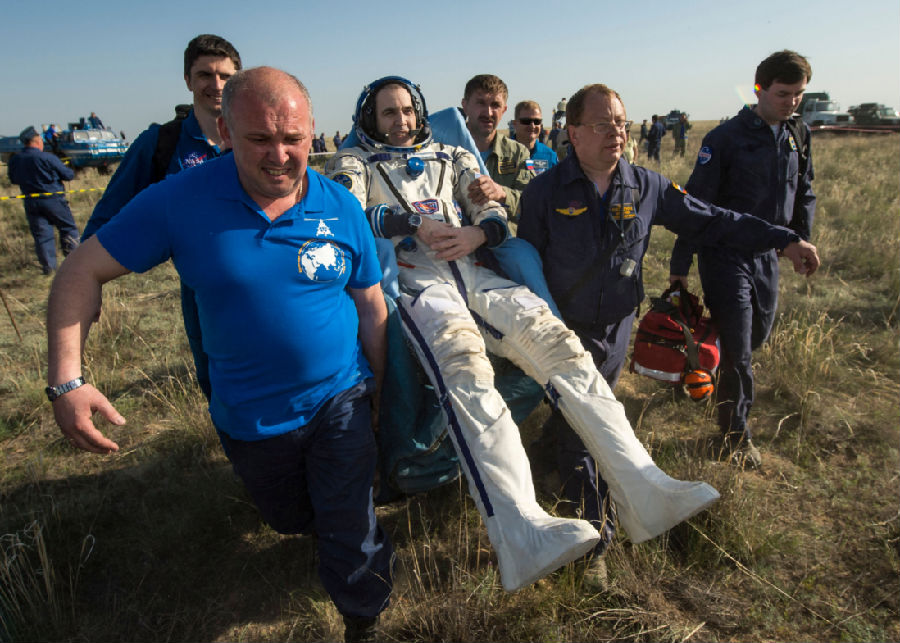(单词翻译:单击)
Have you ever wondered why astronauts need some assistance after landing from space?
你有没有好奇过,为什么宇航员从太空着陆后需要别人的一些帮助?
In this episode, let's find out how the shift from zero gravity-to-with gravity affects us.
在本集中,让我们看看从零重力到有重力的转变是如何影响我们的。
A human, who is an earthling ever since, struggling to walk on Earth? Curious, aren't we?
一个一直生活在地球上的人类,竟然有一天在地球上行走会变得很困难?是不是对此很好奇?
Earth has its own gravity. Hence, it is what helps our feet in the ground, and keeps everything in place.
地球本身存在着重力。也正因为这样,才能让我们在地面上站稳脚跟,并让一切事物伫立在适当的位置。
However, life in space is a different story, for space has zero gravity.
但太空中的生活则是另一回事了,因为太空中是零重力的。
And because of this, it takes such a toll on the human body that astronauts literally have to learn how to walk again once they're back on Earth, after quite a duration of being in space.
正因如此,在太空中待了很长一段时间的宇航员,当他们回到地球时,就不得不重新学习如何走路。
How is this even possible? It is because space is messing up our sense of orientation.
这怎么可能呢?这是因为太空会干扰我们的方向感。
Being on Earth, we all are aware of our directions. But on space? Not so much.
在地球上,我们都知道自己的方向。但在太空中却不一定了。
Sensors that are part of our vestibular system that controls our balance, and is located in our ears, are thrown off when in space.
我们耳朵内的传感器是控制平衡的前庭系统的一部分,在太空中会被关闭。
This causes astronauts to feel dizzy in the first few days of having zero gravity.
这通常会导致宇航员在失重的最初几天感到头晕。
That is why it takes a lot of body readjustments for astronauts once they're back on Earth, hence, the trouble in walking.
这就是为什么宇航员回到地球后,身体要进行大量的重新调整,也正因此,行走会遇到困难。

But, is this all? Alongside having zero gravity affects our sense of orientation, long periods in space also affect the human body itself.
但这就是全部吗?除了失重会影响我们的方向感外,长时间待在太空也会影响人体本身。
Astronauts often experience pain on their feet and other parts of the body after landing from space.
宇航员从太空返回着陆地面后,经常会经历脚和身体其他部位的疼痛。
Why is this? Because the significant adverse effects of long-term duration of having no gravity include muscle atrophy and deterioration of the skeleton.
这是为什么呢?因为在长期无重力的条件下,会造成显著的不良影响,包括肌肉萎缩和骨骼退化。
Aside from this, being in space has physiological effects and substantial damage in the gastrointestinal tissues of astronauts too.
除此之外,在太空中也会对宇航员的胃肠组织造成生理上的影响和实质性的损伤。
Scientists reported last 2017, that there are significant changes in the brain structures of the astronauts that had gone to space.
科学家们在2017年报告称,进入太空的宇航员,其大脑结构发生了显著的变化。
That is why astronauts also try their best to exercise for at least 2 hours a day to keep up muscle mass and bone density while in microgravity,
这就是为什么宇航员在微重力环境下也要尽量每天锻炼至少2小时,以保持肌肉质量和骨密度,
but it still doesn't guarantee having no walking problems after coming back on gravity.
但这仍然不能保证在恢复重力后不会出现行走问题。
Astronauts have to go through a series of physical and medical tests to see how their bodies withstood living in space, once they got back.
宇航员返回地面后,必须经过一系列的身体和医疗测试,以观察他们的身体是如何承受在太空中的生活的。
To sum it up, having a microgravity environment for a long time greatly affects our bodies not just physically.
综上所述,长期处于微重力环境对我们身体的影响不仅仅是身体上的。
This triggers to having lots of research projects regarding on how humans can survive in space for extended and indefinite periods of time.
这引发了许多关于人类如何在太空中长期和无限期生存的研究项目。
The core challenge in overcoming this is to understand the effects and impact of long-term space travel on the human body.
克服这一问题的核心挑战,是了解长期太空旅行对人体的冲击和影响。


